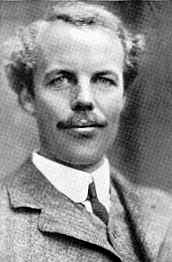| Profile | Major Works | Resources |
Arthur Cecil Pigou, 1877-1959.

Cambridge Neoclassical
economist.
The son of an army officer, Arthur Cecil Pigou was educated at Harrow and, from 1896, King's College, Cambridge. Starting off reading history, Pigou studied economics under Alfred Marshall as part of the Moral Science Tripos, quickly becoming a prize pupil. Through Marshall's efforts, Pigou began lecturing in economics himself in 1901, became a fellow of King's in 1902 and won the coveted Adam Smith Prize in 1903.
Arthur C. Pigou made his name in 1903, when he leaped headlong into the famous Tariff Reform debate raging in Britain. Pigou deployed his pen and theoretical skills to countering the popular proposal to abandon free trade and embrace the 'imperial preference' system which would turn the British Empire into a protectionist trade bloc. Marshall, the inherent academic, had long frowned on delving into the muck of public policy, but Pigou embraced it with vigor. Indeed, in this and his subsequent works (1905, 1906, 1912), one can properly credit Pigou for launching the 'policy arm' of Cambridge Neoclassicism, turning its theoretical musings into a public science of practical policy relevance, reminiscent of the role played by Classical economists earlier in the century.
In 1908, Pigou succeeded Marshall as Professor of Political Economy at Cambridge, in a famous controversy. The chair had long been promised to former Marshall pupil Herbert S. Foxwell, who had reluctantly accepted the chair at UCL back in 1881, on the promise that he would return to succeed Marshall at Cambridge. But by 1908, Marshall's preferences had changed and he secured Pigou's appointment to the chair, creating much bitterness with Foxwell. To this injury was added insult in 1916, when Pigou petitioned for exemption from military service in World War I, on account that there was "no one" at Cambridge able to replace him (Foxwell was still lecturing there).
Holding the Cambridge professorship from 1908 to 1943, Arthur Cecil Pigou personified the "Cambridge Neoclassicals" - the heart of the Marshallian orthodoxy in the first third of the century. His main claim to fame is his Wealth and Welfare (1912, revised 1920 as Economics of Welfare). Here, Pigou brought social welfare into the scope of economic analysis. In particular, Pigou is responsible for the famous distinction between private and social marginal products and costs and the idea that governments can, via a mixture of taxes and subsidies, correct such market failures - or "internalize the externalities".
But Pigou's luck soon ran out. His approach came immediately under severe attack from Robbins and Knight. The "New Welfare Economics" that arose in the late 1930s dispensed with much of Pigou's analytical toolbox altogether. Later on, the Public Choice theorists assaulted Pigou's approach for its naive "benevolent despot" assumption and, finally, Coase demonstrated the irrelevance of Pigouvian taxes when property rights are properly assigned.
Another source of bad luck was John Maynard Keynes decision to use Pigou as the "straight man" in his polemics. In the 1936 General Theory, Keynes held up Pigou's Theory of Unemployment (1933) as the example of everything that was wrong with Neoclassical macroeconomics. Pigou never quite recovered from the shock of being betrayed by his old colleague and friend. The rest of Pigou's life was spent occasionally counterattacking (e.g. with the "Pigou Effect" (1943, 1947) or submitting (e.g. 1945, 1951) to the Keynesian Revolution.
|
Major Works of Arthur C. Pigou
|
HET
|
|
Resources on A.C. Pigou
|
All rights reserved, Gonçalo L. Fonseca
